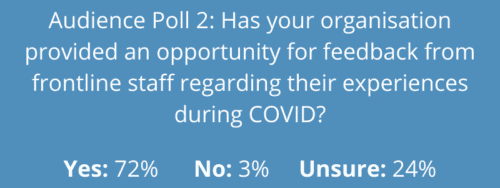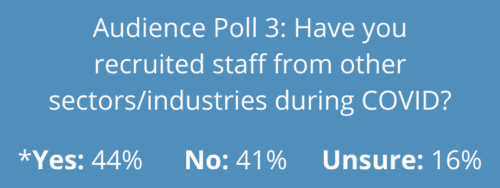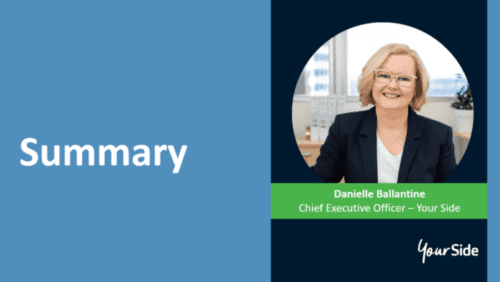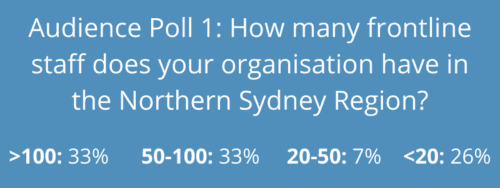November 2020 Northern Sydney Regional Forum – Voices from the frontline
Written by Ilsa Bird – Sector Support Coordinator
On 25 November 2020 the Your Side Sector Support Team hosted more than 60 attendees at our second online Regional Forum for 2020. This year’s theme was ‘voices from the frontline’ and our goal was to share the experiences of frontline workers during 2020 and celebrate their hard work and dedication during the COVID-19 pandemic. In the summary below, our Q&A panel guests discuss themes such as change during COVID, coping with stress and burnout, post-COVID service delivery and role expectations.
Watch the full recording (1 hour and 8 mins)
About our panel
Mudu works primarily with people with dementia and has been a frontline worker for 5 years.
Kathleen has been a support worker for 3 years and has a background as a pre-school teacher.
Fiona has been a support coordinator for 5 years and has a background in music and drama teaching.
Below is a wrap up summary from the Q&A panel hosted by Ilsa Bird, Sector Support Coordinator.
Q&A Discussion
Q1. During COVID, what challenges were created for service delivery and what adjustments were made to balance the needs of your clients?
Mudu:
- Balancing risk factors of COVID with the impact of social isolation of clients and the ongoing mental health issues that were associated.
- Smaller teams which led to greater stress and burnout
- Time management. Things could not be done the same way, everything had to be coordinated and this was not ideal for people living with dementia
- Technology allowed for connection and innovative service delivery e.g. go for a walk or go shopping with a client via a video call.
Q2. Stress and burnout were major risks for frontline workers during COVID, what strategies did you put in place to manage your mental and emotional wellbeing?
Mudu:
- Self care e.g. walking, baths, lighting candles whatever made me feel good. Don’t stress the small stuff
- Connect with people and support from Care Manager
Q3. Every organization was unprepared to cope with a global pandemic but what is one lesson that you have learned during COVID?
Fiona:
- Our sense of connectedness and community spirit has prevailed during COVID. Examples include witnessing community running errands for elderly neighbors or leaving care packages. Care workers going over and above to care for their clients.
- The sense of community will help us to overcome adversity in the future

Q4. During COVID, what is one thing that your organization has done that has supported you to perform your role more effectively?
Kathleen:
- Having a fantastic support system and the key is communication.
- Communication: checking up on staff health and wellbeing, providing lots of information about COVID to staff and clients
- Training and supply of PPE, PPE posted to us
- Regular Zoom meetings, emails, texts, phone calls and items posted
Q5. What mode of communication did you find the most effective/helpful when receiving COVID updates?
All:
- Email because it can be read in your own time, doesn’t disrupt your time with clients, all the information is there in black and white, you can share easily with clients who didn’t have email, use a resource and as fact
Q6. How have your experiences this year shaped the way you will do your job post-COVID? For example, what has changed and what will stay the same?
Kathleen:
- How we interact with people have changed because of COVID and for example, social distancing has changed how much we can reassure using touch
- We are required to reassure people constantly, so they feel safe and I will continue this next year
- Where you source reliable information about COVID is very important, some information created fear in clients
- Open communication is important, and I would like this to continue
- Self-care was a priority this year and I will continue this next year
- Continue to ask check in questions with clients about health and welfare
- Attitude towards hygiene has changed, carry hand sanitizer all time and understand that germs can be very harmful
Fiona:
- More creative ways to connect for example, connect with clients with music instead of touch

* Organisations reported recruitment from travel, tourism, hospitality industries and disability sector
Q7. What advice would you give to organisations when recruiting new staff regarding role expectations?
Mudu:
- People need to be made aware that the clients may have additional mental or physical comorbidities and so priority must be person centered care not just services. It is a fundamental trait for an aged care worker.
- Care workers must be able to problem solve and we wear many hats
- Working in this space can be lonely and isolating
- They should expect to do their role without recognition and acknowledgement
- Care workers advocate for clients, we are friends and provide emotional support, we are part dieticians, part spiritual guides while trying to maintain a professional boundary, which is difficult.
- It can be challenging work and it’s not for everybody. It is about finding the right person for the role.
Fiona:
- We exceed over and above our role and take care not to overstep our boundary
- Clients do see us as their friends. There is so much more to our role
Q8. What are some changes that you would like to see in the future of the aged care sector that would improve your job satisfaction?
Fiona:
- Attracting and retaining skilled and committed staff is a challenge
- Staff stay because they feel obligated to their clients but they feel they are undervalued and under-payed
- Our wages in this sector do not reflect the complex social, physical, emotional nature of our work or value the importance of care. Equitable remuneration is imperative
- Implementation of career pathways for progression into specialised roles within the industry would give incentive to care workers to further knowledge and undertake professional development
- Self-funded work-related training is also a disincentive for an aged care worker who is already receiving a low wage
- We will all be in need of aged care one day; do we like what we see?
Q9. If you could give your manager one piece of advice for 2021, what would it be?
Fiona:
- Quote: “Good care starts with the culture of the organization and this has to start at the top”. This is not always seen in the aged care industry
- We work independently and have little contact with our management and our organisations.
- Feedback and acknowledgement for us comes from scheduling coordinators and not from managers, I believe we need direct feedback.
- This direct feedback from management helps to retain staff and improve workplace culture
- My advice to my manager would be check in, get to know them and let them know they are a valued member of the organisation
Audience Q & A
How do maintain professional boundaries with clients who were nervous or afraid during COVID?
Fiona: encouragement and reassurance. Taking concerns on board and reassuring them they are being heard
Kathleen: communicating with them and reassuring them
What are your favourite parts of your role?
Mudu: Making a difference in someone’s life and sometimes even without them being aware, small things to improve their quality of life.
Fiona: Getting to know people, meeting people with extraordinary lives and hearing tales that lift me up and inspire me. I value this so very much.
Kathleen: Talking and chatting with clients. Hearing their life experiences and their knowledge. I love history and sharing history with them, sharing our life stories.
This year has been a challenge for all of us and when we are being challenged, we learn things about ourselves. What have your learned about yourself during 2020?
Fiona: Looking for the best in adversity this year has improved my resilience. I have always felt my sense of connectedness was a strength but 2020 allowed me to find different ways to connect.
Mudu: Accepting that things are not always in our control and that I can not always problem solve my out way of things. Evolving and letting go of things. Going forward that will make me more open to things.
Kathleen: Being happy and positive in every situation
Thank You Video
During 2020 our frontline aged care staff and volunteers have worked tirelessly to ensure that clients received services even amongst all of the challenges that were created by COVID-10. In this video created by the Your Side Sector Support Team, service providers in the Northern Sydney Region share their gratitude for the enduring efforts of frontline aged care workers and volunteers during the 2020 pandemic.
Watch the thank you video here (4 min 45 sec)
Closing Speech

I really want to thank our Forum speakers today; Kathleen, Mudu and Fiona. Giving up your time and telling your story as a frontline worker in 2020. Also to Ilsa and Rosi for your work in the background in coordinating the forum.
When designing the Forum’s theme, the sector support team were acutely aware that Covid has consumed the lives of all aged care workers, and the general public. We recognised that as an industry, and during unprecedented circumstances, that there were many experts delivering instructions and new work process’.
These changes were often made with imperfect and ever evolving information, so we asked ourselves “how did care workers, at the front line respond to these changing instructions, and what judgement did they apply when the instructions and the clients needs did not align. More importantly, how can we as a sector learn from front line workers, as the experts in delivering care?
And, what we learned today included;
- As an industry, we are recruiting outside the sector – given that we are facing a workforce shortage, and Covid placed more pressure on our workforce, accessing transferable skills such as hospo or travel sector, is wonderful to see. For those who haven’t – think of the transferable skills of these sectors and how they can apply them in community care. As Mudu said, Careworkers wear many hats, and need to problem solve daily. The role can be isolating. Careworkers can do this without recognition and acknowledgement.
- Smaller teams placed more stress and risk of burn out. Manage this through self-care which is personal to each individual.
- Questioning ourselves as to why we were unprepared – but we learned lessons, such as sense of connection and social responsibility prevailed. Fiona gave some beautiful examples of this. These lessons reinforced our values that we will take forward in a post covid world.
- Care workers need a support system as much as our clients. That is through good communication best communication experience was via email and careworkers could relay the info to clients and was least disruptive, training, PPE delivered to workers, and thank you gifts.
- Value our clients as individuals – people think and behave differently so reassurance was important. Reinforce that we can only take one day at a time.
- Other ways to connect, such as music, singing, facetime while shopping/walking; technology has brought the outside in.
- The industry award does not reflect the skills and talents that are required for being a careworker. Creating career pathways and incentives to develop skills. We will all be in need of aged care one day – is the sector today the sector that we want caring for us?
- Good care starts with the culture of the organisation! The remoteness of care work and working independently means having little contact with management, but high contact with rostering. To the managers, please check in with your staff!
Aged Care frontline workers were in a constant state of re-learning and supporting clients through extraordinary uncertainty. We have all been witness to our staff turning up to deliver care, despite also feeling anxious, unsure and tired. We want to thank you for your commitment to care, demonstrating that care work is more than a job, it is a vocation.
I also want to say thank you to the managers, team leaders, supervisors. It’s not an easy decision to send your staff out to an uncertain world. They carried a pressure on their shoulders ensuring that care staff and clients were safe.
To our care workers, your sector is behind you all the way.
“thank you”.
To ensure that you don’t miss out on future Forums, events and updates from Sector Support, sign up to the monthly e-Bulletin here.
Contact us: sectorsupport@yourside.org.au
